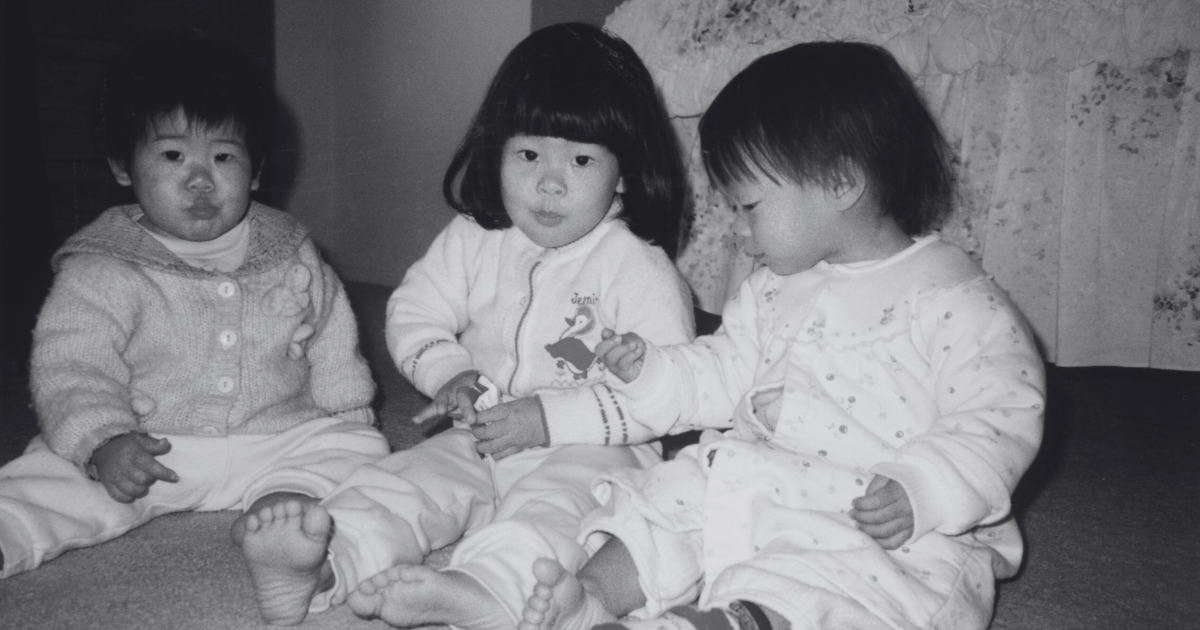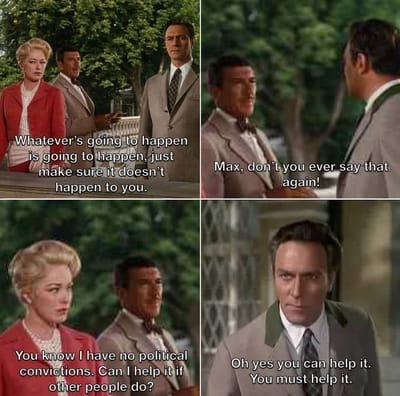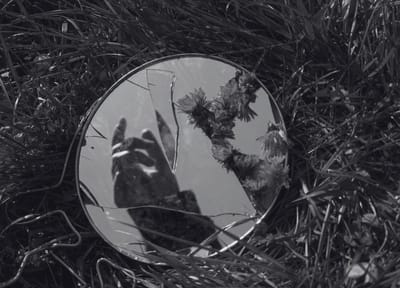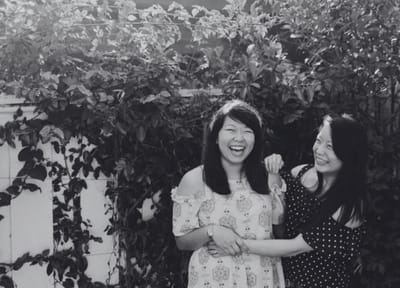Platonic Soulmates: What Happened to Our Friendships?

Housekeeping:
- ✨Last day for the giveaway for Bury Our Bones in the Midnight Soil by V.E. Schwab!! Details in this post.✨
- What I've been up to this week
- Commenting on posts is easy if you'd like to do so. When you click the comment icon at the bottom of this email, it'll ask you to sign up/in. You will sign IN with the email address you used to subscribe, and Ghost will send you a link once you've done so. Follow the steps from there and tada! 👻
- Can you do me a favour? If you've read my novelette, A Girl Made of Time, would you please leave a short review? It would help with visibility a lot! Even one sentence saying what you liked/disliked about it would be wonderful. Thank you so much to those who have already done so. You can leave a review on Amazon, Goodreads, Storygraph, Page bound, or wherever you read it. Thank you! (Psst it's free to download)
“You do too much for your friends.”
“You expect too much from friendship.”
“You two act like lovers.”
“My mom thinks we’re lesbians.”
“You’re too intense about your friends.”
“Do you have to talk to your best friend every single day?”
Many cultural critics argue that the art of friendship is in decline. The United States surgeon general has named loneliness an epidemic. People are lonelier than ever, and they don’t know what to do about it. Why is that?
Platonic relationships have been central to my life for as long as I can remember. Blood has never been the only thing that defines a family for me; I grew up with three other families with whom mine wove our lives. They are still an integral part of my community.
When my parents immigrated to the U.S. from Taiwan, we lived with one of these families for the first two years of my life. When my father battled leukemia for a significant chunk of my formative years, they were the ones there supporting my brother and me, and when he was diagnosed with cancer again in 2020, they were the ones we called on.
We have a shared history that cannot be replicated. We call each other godfamily—like godparents, except a whole family—and we are there for each other as family would be. I’m closer to them than I am to my blood relatives, who were never there for me during the most turbulent times in my life.
I credit this small village with playing an essential role in how I came through a traumatic childhood (somewhat) functional, and I believe it’s because of these relationships that I came to view friendships as essential rather than optional.
But my experience is unique, unfortunately so, as it shouldn’t be.
Have we lost something in our society?
Rhaina Cohen’s book, The Other Significant Others, examines this very question through a number of case studies and historical examples. She’s also interviewed on the Ezra Klein podcast and by Anne Helen Petersen in this post. They discuss some thoughts about why friendship is no longer at the center of society as it once was.
One of the theories is that people now expect much more out of their romantic partners, who now must fulfill the roles that friends, family, and the immediate community once filled. It’s an interesting notion, but not the full story.
Consider the example of J. R. R. Tolkien and C. S. Lewis, who nurtured deep and rich friendships with each other and others. They also had meaningful relationships with their wives. Tolkien famously based his legendary love story of Beren and Luthien on his wife and himself, and their names are etched on both their gravestones.
But take a look at what Tolkien and his dear friend, Geoffrey Smith, wrote to each other:
“I feel just the same to both of you—nearer if anything and very much in need of you—I am hungry and lonely of course—but I don’t feel a member of a little complete body now.”
—J.R.R. Tolkien, letter to Geoffrey Smith
“I wish I could find you—I search for you everywhere.”
—Geoffrey Smith, letter to Tolkien
Modern audiences often interpret the way Tolkien depicts male friendships in his books as queer but to do so is to diminish the strength of those bonds. It says more about our contemporary emotional poverty that such deep and intimate platonic relationships are so quickly mistaken for sexual because of their sheer rarity in today’s society.
Indeed, Rhaina mentions other people in the interview who wrote to their friends with phrases that could be mistaken for letters to lovers by people today. The language is emotionally intense, effusively affectionate—expressed openly and freely.
“This heart of mine, however feeble and how soon soever it may cease to move, its last pulsations shall vibrate for you.”
—Thomas B. Wait, letter to George Thatcher
As Rhaina says in her book, such unrestrained warmth between men is almost unheard of outside of couplings nowadays.
Women get a bit more leeway here, as it’s more socially acceptable to be both verbally and physically affectionate with each other. But as indicated from one of my opening quotes, even my best friend and I have been mistaken for a couple at one point by our own family members. We have the same philosophy toward friendships, and the equal amount of effort we put into each other has allowed us to flourish for twenty years now, despite only living in the same city for the first three years of our relationship. My husband and all her previous partners have known we come as a package.
In contrast, men have a harder time, with the perceived threat of being misconstrued as gay, along with a perceived loss of masculinity. Indeed, Rhaina mentions the stigmitisation of homosexuality as a factor in the diminishing centrality of friendship.
What happened to our friendships?
Many others have given their views on the matter that I won’t repeat (see my reading list below), but I have some thoughts on this as well.
- People used to spend their entire lives in the same physical area with the same people. With increased mobility, we have increased disconnect. There are benefits to this, of course, but one of the things we’ve lost is the ability to put down roots. It’s difficult to build meaningful relationships when you don’t know how long you’re going to live in a single place, and you don’t know how long your potential friend is going to live there either. Someone you connect with may well find a new job across the country in a few months or the next year, which I’ve experienced multiple times. The uncertainty leaves people not wanting to bother.
- More and more of “life” is being “lived” online. There’s a certain comfort in that. It’s easier. For the chronically ill like myself, I’m not one to criticise, and like many others, I’ve made some significant connections with people I’ve met online over the years, although I do think there’s something to be said for those we are able to invite into our messy homes and lives. COVID-19 also showed us how much could be done online rather than in person, but I think we’ve lost the value of face-to-face contact in a way because of it.
- We've become lazy and selfish, less inclined to invest in high-stakes relationships. This doesn’t just apply to friendships, from what I’ve observed; it also applies to our romantic relationships. It’s all about less stress, less trouble, less friends—or at least, less friends that actually require us to make sacrifices. We allow less room for human things like conflict, touting leaving people behind as “setting healthy boundaries,” when in fact, we simply don’t want to put in the effort that comes with working through friction. We prefer low-maintenance friends we don’t have to go out of our way for, those we can fit into the little openings in our busy schedules. By not being active participants in each other’s lives, we avoid having to engage in the messiness of daily life when it’s inconvenient. In short, we have come to avoid any sort of discomfort.
- Along a similar vein, we’ve hyped the gospel of individualism to the point that to involve ourselves in others’ lives beyond the cursory seems like breaking some unspoken rule that we ought to just mind our own businesses. In my Taiwanese culture, it is essential to keep the (blood) family’s reputation intact, which often means never sharing our deepest struggles with anyone outside the family. There’s an ingrained shame culture that prevents admission of weakness or failings, which, combined with the sister side of not inconveniencing others, breeds a lifestyle of silence. I spoke of my godfamily in the introduction, but as one of my godsisters and I have discussed before, we still experienced limitations to openness because of those deeply rooted cultural factors.
- Social media provides an easy way to stay updated on people’s lives. Since leaving it a couple years ago, I've realized how much I relied on it for a false sense of connection with people. These apps had made it so much easier to partake in a sort of pseudo-friendship where it feels like I’m keeping up with people without actually putting in any effort to do so.
- Increased mobilisation and globalisation create this idea that we can be friends with even more people than ever before. However, as Robin Dunbar (of the famous Dunbar's number) writes in his book, Friends, the maximum number of people we can be close to is still five. Related to the first and third points, with more options comes an underlying belief that somewhere else is something better. When conflicts or difficulties arise, it's tempting to look around and think of all the other people one could instead have a fulfilling friendship with who wouldn't be a "drain on one's energy." In reality, unless there are serious red flags and abusive behaviour, every single person comes with "stuff."
The cliche remains true: anything worth having takes work. That applies to our friendships as well.
So what do we do now?
There is no simple solution. We can’t go back to living our whole lives in one place the way people did a few generations ago. And when people move away, social media can be a vital way to keep up with old friends.
Not everyone is fortunate enough to find kindred spirits in their immediate surroundings. I recognise I’ve been lucky in that regard. I’m also not saying everyone needs a lot of friends; we all have different emotional needs.
Online or offline, however, I think it ultimately comes down to a perspective shift: from viewing friendships as something to fit into the gaps of our lives, or to making them a priority and reshaping our lives around them so they can thrive. That may require us to have some potentially awkward and definitely vulnerable conversations about what we want and expect from our friends. It takes periodic negotiating and re-negotiating, the same way we would in a romantic relationship.
None of my closest friendships have been untouched by fights and conflicts, misunderstandings and reconciliations. Yet our bonds have grown deep roots into solid ground as a result of mutual commitment to work through them together.
There came a time a couple years ago when our family needed our village more than we ever had before (which is saying a lot, all things considered). A social worker told us to gather a support network for a period of thirty days and to send her a list of the people who would be on it. When we did, she told us she had never seen such a large list in all her years as a social worker.
No one is immune from life’s troubles. Sooner or later, we will all encounter grief and hardship. When those storms come, we need our true friend(s).
In my upcoming short story collection, I explore love in all its forms, including friendship. Sign up here to be notified when it launches.
About Me: I’m Tiffany, a literary fantasy, and memoir author. My writing has been published by The Cultivation Project and Renewal Missions. I’ve been writing this publication since 2023. All words are 100% human-generated by me without AI assistance. Order my books here or here.
Further Reading/Listening (I’ve shared some of these before, but they’re worth reading if you haven’t yet):
- America’s Friend Famine is Worst Among Male Professionals (James F. Richardson)
- The Friendship Problem: Why Friendships have Started to Feel Strikingly Like Admin (Rosie Spinks)
- The Ties that Bind (Elliot Kirschner)
- What Can We Expect from Friendship ( Ava)
- What Relationships Would You Want, if You Believed They Were Possible? (The Ezra Klein Show)
- The Other Significant Others: Reimagining Life with Friendship at the Center ( Rhaina Cohen)
- The Friendship Dip and The Dark Heart of Individualism (Anne Helen Petersen)
- On Friendship (Marc Typo and Rachel Leeke)
- The Origin of the Family (Sophie Lucido Johnson and Esmé Weijun Wang)

Things I enjoyed reading this week:
- this article about sharing your story as an introvert, by Goldie Chan
- Kevin Kelly's (of 1000 true fans fame) article with everything he knows about self-publishing
- Dan Blank writing about doing less when almost everyone seems to be pressuring you to do more.
- Jeannie Ewing's personal essay about the unseen tasks as a mother.
- this one by Mary Tabor in honour of her son, which made me want to weep.
- the short story, "The Merchant and the Alchemist's Gate" by Ted Chiang in his collection, Exhalation
Thank you, as always, to my patrons for sponsoring this newsletter, especially my council members: Joanne L., Tiffanie L., Joanne Yi, Stanley Sze, Endora, Albert L., Matthew Long, and Mary Roblyn.

No spam, no sharing to third party. Only you and me.





Member discussion